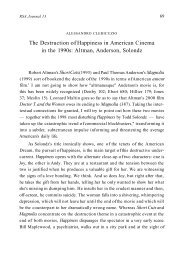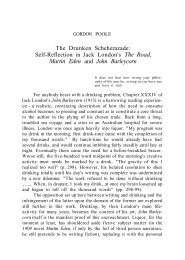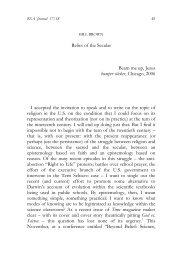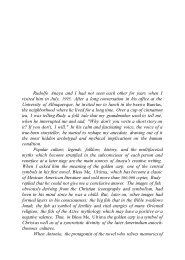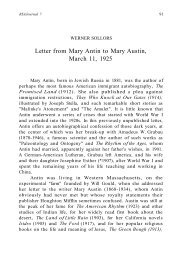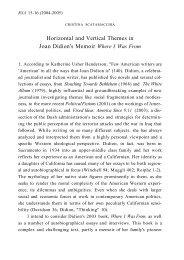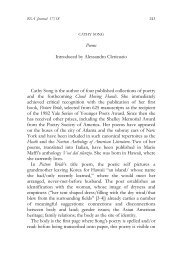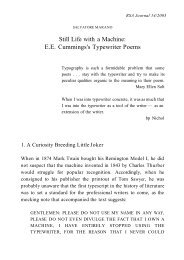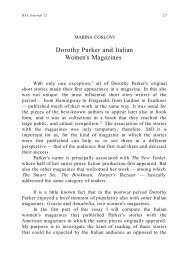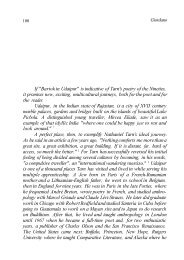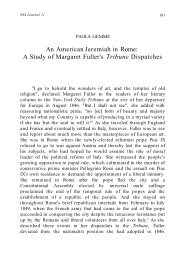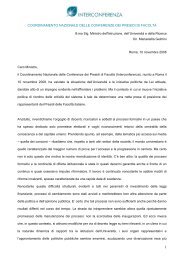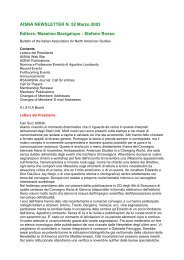Myth and Carnival in Robert Coover's The Public Burning - aisna
Myth and Carnival in Robert Coover's The Public Burning - aisna
Myth and Carnival in Robert Coover's The Public Burning - aisna
- No tags were found...
You also want an ePaper? Increase the reach of your titles
YUMPU automatically turns print PDFs into web optimized ePapers that Google loves.
12 Da<strong>in</strong>otto<strong>The</strong> ways we can arrange data to make reasonable histories out of themare virtually <strong>in</strong>f<strong>in</strong>ite. <strong>The</strong> <strong>Public</strong> Burn<strong>in</strong>g exploits <strong>Coover's</strong> notions ofhistory as fictional construct <strong>and</strong> of History as mythopoiesis, bothrely<strong>in</strong>g on language to create systems by arrang<strong>in</strong>g <strong>and</strong> rearrang<strong>in</strong>gr<strong>and</strong>om elements <strong>in</strong>to significant events:What was fact, what was <strong>in</strong>tent, what was framework, what wasessence? Strange, the impact of History, the grip it had on us, yet it wasnoth<strong>in</strong>g but words. Accidental accretions for the most part, leav<strong>in</strong>g mostof the story out ... What if we broke all the rules, played games with theevidence, manipulated language itself, made history a partisan ally? Ofcourse, the Phantom was already onto this, wasn't he? (PB 136)Nixon here endorses a vision of history-mak<strong>in</strong>g as partisan activity: onthe one h<strong>and</strong> he accuses the Phantom (symbol of a Communist Evil) of"play<strong>in</strong>g with evidence;" on the other he seems to suggest that the"evidence" itself—just like history—is but a l<strong>in</strong>guistic <strong>in</strong>vention. Fromthis perspective, Uncle Sam offers his a lesson <strong>in</strong> realpolitik:Hell, all courtroom testimony about the fact is ipso facto <strong>and</strong> tacitouslya boldface lie, a<strong>in</strong>'t that so? Moonsh<strong>in</strong>e! Chicanery! <strong>The</strong> old gum game!Like history itself—all more or less bunk... the fatal slant<strong>in</strong>dicularfutility of Fact! Appearances, my boy, appearances. Practical politicsconsists <strong>in</strong> ignor<strong>in</strong>g facts! Op<strong>in</strong>ion ultimately governs the world. (PB 86)A reference to Michel Foucault is <strong>in</strong>evitable at this po<strong>in</strong>t. <strong>The</strong>same notions of history as production <strong>and</strong> legitimation of a social orderseem to be at work both <strong>in</strong> <strong>Coover's</strong> fiction <strong>and</strong> <strong>in</strong> Foucault'squestion<strong>in</strong>g of historical truth, for example <strong>in</strong> <strong>The</strong> Archeology ofKnowledge. Moreover, both Coover <strong>and</strong> Foucault seem to s<strong>in</strong>gle out thenature <strong>and</strong> force of power <strong>in</strong> its ability to "mythify" an epistemologicalread<strong>in</strong>g of reality as absolute truth. Without suggest<strong>in</strong>g a direct<strong>in</strong>fluence of Foucault on Coover, one notices the similarity betweenFoucault's notion of power as dissem<strong>in</strong>atedAt the crossroads, <strong>in</strong> the gardens, at the side of the road be<strong>in</strong>g repairedor bridges built, <strong>in</strong> workshops open to all, <strong>in</strong> the depths of m<strong>in</strong>es thatmay be visited... placards... <strong>in</strong>scriptions, posters, symbols, texts ...



